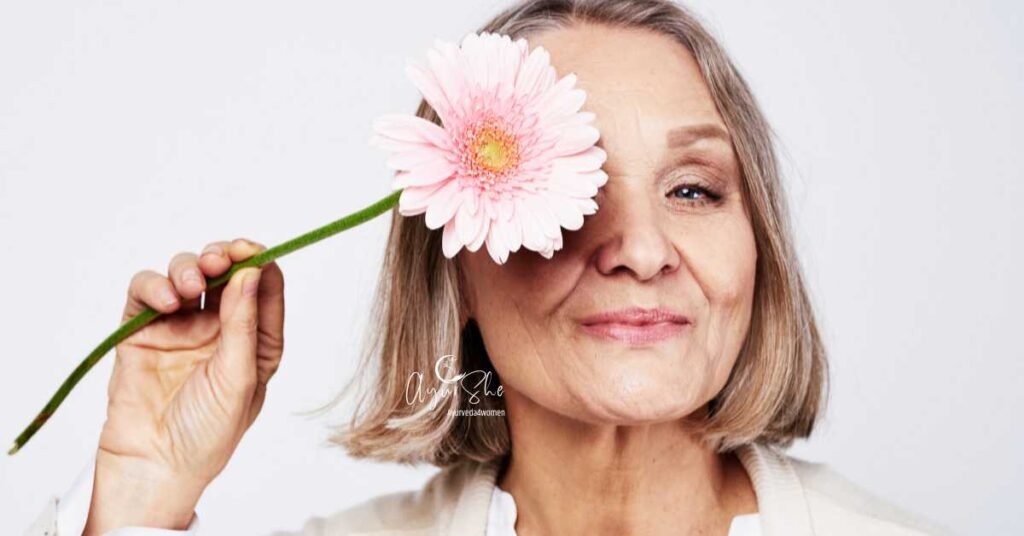Introduction
Menopause is a natural biological process that marks the end of a woman’s reproductive years. It typically occurs between the ages of 45 and 55, although it can happen earlier or later for some women. Menopause is characterized by the cessation of menstrual periods and the decline in reproductive hormones, particularly estrogen and progesterone. Let’s know more about Menopause symptoms, causes and Ayurvedic management.
Menopause Symptoms
The signs and symptoms of menopause can vary from woman to woman. Some common Menopause symptoms include:
1. Hot flashes: Sudden feelings of warmth, often accompanied by flushing and sweating.
2. Night sweats: Excessive sweating during sleep, which can disrupt sleep patterns.
3. Vaginal dryness: A decrease in vaginal lubrication, leading to discomfort during sexual intercourse.
4. Mood swings: Fluctuations in mood, including irritability, anxiety, and depression.
5. Sleep disturbances: Insomnia or difficulty staying asleep.
6. Fatigue: A general feeling of tiredness and lack of energy.
7. Urinary problems: Increased frequency of urination or urinary incontinence.
8. Changes in sexual function: Decreased libido and changes in sexual desire.
Causes of Early Menopause
While menopause typically occurs around the age of 50, some women may experience early menopause, which refers to menopause before the age of 40. Several factors can contribute to early menopause:
1. Genetics: A family history of early menopause may increase the likelihood of experiencing it.
2. Autoimmune disorders: Certain autoimmune disorders, such as thyroid disease and rheumatoid arthritis, can affect the ovaries and lead to early menopause.
3. Medical treatments: Some medical treatments, such as chemotherapy and radiation therapy, can damage the ovaries and induce early menopause.
4. Surgical removal of the ovaries: Surgical removal of the ovaries (oophorectomy) can result in immediate menopause.
5. Smoking: Women who smoke are more likely to experience early menopause than non-smokers.
6. Other factors: Certain lifestyle factors, such as excessive alcohol consumption and low body mass index (BMI), may also increase the risk of early menopause.
Ayurvedic Management of Menopause
Ayurveda, the ancient Indian system of medicine, offers various natural approaches to manage the symptoms of menopause. Here are some ayurvedic recommendations:
1. Diet: A balanced diet with a focus on whole grains, fruits, vegetables, and healthy fats can help alleviate menopausal symptoms. Including foods rich in phytoestrogens, such as soy, flaxseeds, and legumes, may also be beneficial.
2. Herbal remedies: Ayurvedic herbs like Shatavari, Yashtimadhu, Ashwagandha, Ashoka, Lodhra and Brahmi are often used to support hormonal balance and reduce menopausal symptoms. However, it’s important to consult a qualified Ayurvedic practitioner before taking any herbal supplements.
3. Lifestyle modifications: Regular exercise, such as yoga and brisk walking, can help manage weight, reduce stress, and improve overall well-being during menopause. Stress management techniques, such as meditation and deep breathing exercises, may also be beneficial.
4. Oil massage: Regular self-massage with warm sesame oil can help alleviate dryness, improve circulation, and promote relaxation.
5. Ayurvedic therapies: Panchakarma, a detoxification and rejuvenation therapy in Ayurveda, may be recommended by an Ayurvedic practitioner to help balance the body and mind during menopause.
Conclusion
Menopause is a natural phase in a woman’s life, and while it may come with its share of challenges, it can also be embraced as a time of transformation and self-care. Understanding the signs, symptoms, and causes of menopause can help women navigate this transition more smoothly. Ayurveda offers a holistic approach to managing menopause, focusing on diet, lifestyle modifications, herbal remedies, and Ayurvedic therapies. Consulting with a healthcare professional or an Ayurvedic practitioner can provide personalized guidance for managing menopause effectively and improving overall well-being.


